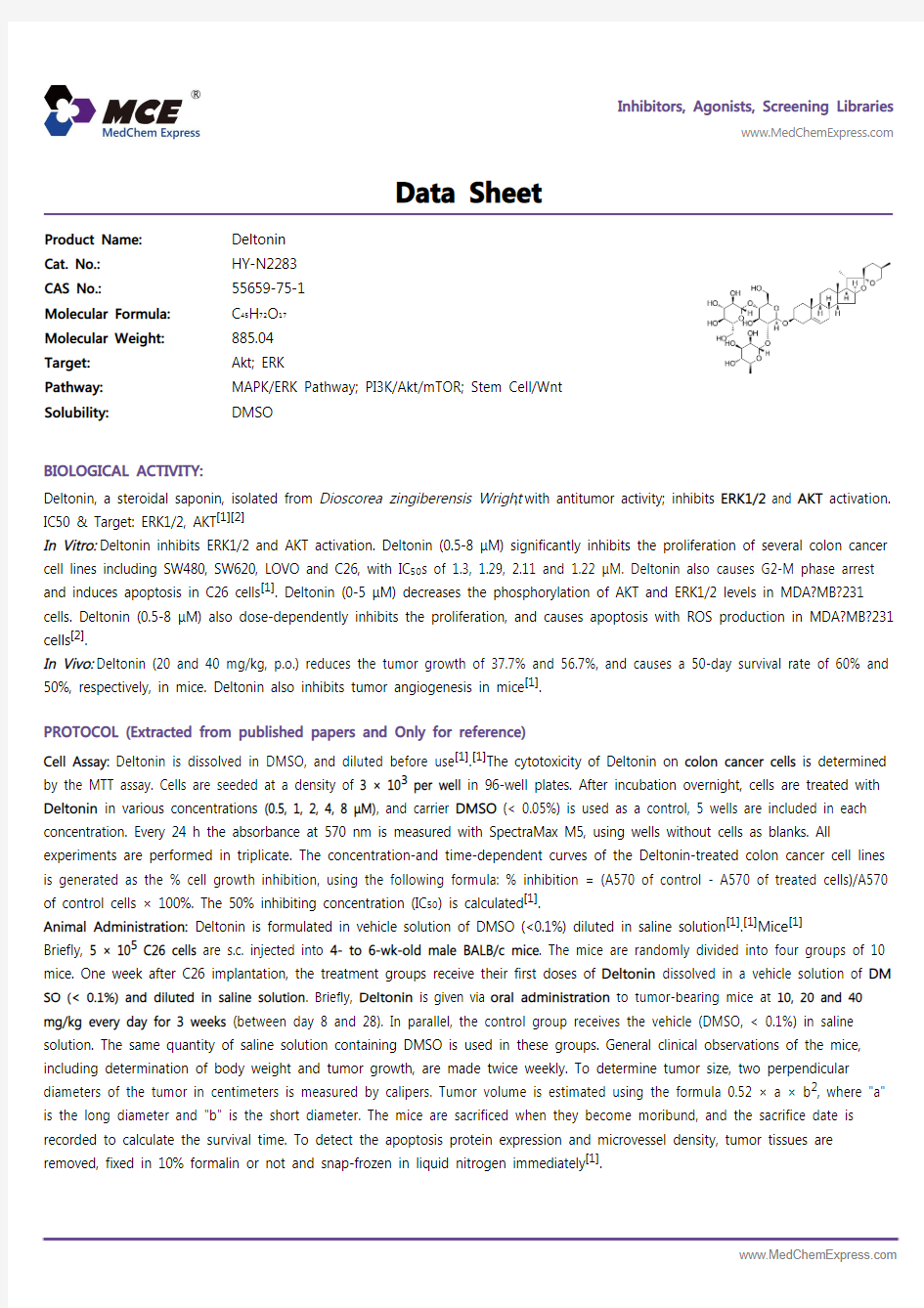Deltonin-DataSheet-MedChemExpress


Inhibitors, Agonists, Screening Libraries
https://www.wendangku.net/doc/179311227.html, Data Sheet
BIOLOGICAL ACTIVITY:
Deltonin, a steroidal saponin, isolated from Dioscorea zingiberensis Wright , with antitumor activity; inhibits ERK1/2 and AKT activation.IC50 & Target: ERK1/2, AKT [1][2]
In Vitro: Deltonin inhibits ERK1/2 and AKT activation. Deltonin (0.5-8 μM) significantly inhibits the proliferation of several colon cancer cell lines including SW480, SW620, LOVO and C26, with IC 50s of 1.3, 1.29, 2.11 and 1.22 μM. Deltonin also causes G2-M phase arrest and induces apoptosis in C26 cells [1]. Deltonin (0-5 μM) decreases the phosphorylation of AKT and ERK1/2 levels in MDA?MB?231cells. Deltonin (0.5-8 μM) also dose-dependently inhibits the proliferation, and causes apoptosis with ROS production in MDA?MB?231
cells [2].In Vivo: Deltonin (20 and 40 mg/kg, p.o.) reduces the tumor growth of 37.7% and 56.7%, and causes a 50-day survival rate of 60% and 50%, respectively, in mice. Deltonin also inhibits tumor angiogenesis in mice [1].
PROTOCOL (Extracted from published papers and Only for reference)
Cell Assay: Deltonin is dissolved in DMSO, and diluted before use [1].[1]The cytotoxicity of Deltonin on colon cancer cells is determined by the MTT assay. Cells are seeded at a density of 3 × 103 per well in 96-well plates. After incubation overnight, cells are treated with Deltonin in various concentrations (0.5, 1, 2, 4, 8 μM), and carrier DMSO (< 0.05%) is used as a control, 5 wells are included in each concentration. Every 24 h the absorbance at 570 nm is measured with SpectraMax M5, using wells without cells as blanks. All
experiments are performed in triplicate. The concentration-and time-dependent curves of the Deltonin-treated colon cancer cell lines is generated as the % cell growth inhibition, using the following formula: % inhibition = (A570 of control - A570 of treated cells)/A570of control cells × 100%. The 50% inhibiting concentration (IC 50) is calculated [1].
Animal Administration: Deltonin is formulated in vehicle solution of DMSO (<0.1%) diluted in saline solution [1].[1]Mice [1]
Briefly, 5 × 105 C26 cells are s.c. injected into 4- to 6-wk-old male BALB/c mice . The mice are randomly divided into four groups of 10mice. One week after C26 implantation, the treatment groups receive their first doses of Deltonin dissolved in a vehicle solution of DM SO (< 0.1%) and diluted in saline solution . Briefly, Deltonin is given via oral administration to tumor-bearing mice at 10, 20 and 40mg/kg every day for 3 weeks (between day 8 and 28). In parallel, the control group receives the vehicle (DMSO, < 0.1%) in saline solution. The same quantity of saline solution containing DMSO is used in these groups. General clinical observations of the mice,including determination of body weight and tumor growth, are made twice weekly. To determine tumor size, two perpendicular
diameters of the tumor in centimeters is measured by calipers. Tumor volume is estimated using the formula 0.52 × a × b 2, where "a"is the long diameter and "b" is the short diameter. The mice are sacrificed when they become moribund, and the sacrifice date is recorded to calculate the survival time. To detect the apoptosis protein expression and microvessel density, tumor tissues are removed, fixed in 10% formalin or not and snap-frozen in liquid nitrogen immediately [1].
Product Name:
Deltonin Cat. No.:
HY-N2283CAS No.:
55659-75-1Molecular Formula:
C 45H 72O 17Molecular Weight:
885.04Target:
Akt; ERK Pathway:
MAPK/ERK Pathway; PI3K/Akt/mTOR; Stem Cell/Wnt Solubility:
DMSO
References:
[1]. Tong QY, et al. Deltonin, a steroidal saponin, inhibits colon cancer cell growth in vitro and tumor growth in vivo via induction of apoptosis and antiangiogenesis. Cell Physiol Biochem. 2011;27(3-4):233-42.
[2]. Zhang S, et al. Deltonin induces apoptosis in MDA?MB?231 human breast cancer cells via reactive oxygen species?mediated mitochondrial dysfunction and ERK/AKT signaling pathways. Mol Med Rep. 2013 Mar;7(3):1038-44.
Caution: Product has not been fully validated for medical applications. For research use only.
Tel: 609-228-6898 Fax: 609-228-5909 E-mail: tech@https://www.wendangku.net/doc/179311227.html,
Address: 1 Deer Park Dr, Suite Q, Monmouth Junction, NJ 08852, USA
